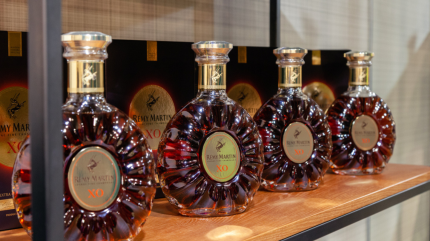
Rémy Cointreau is predicting to be back on track to reaching its 2029/30 sales and operating-margin targets after reporting a slump in sales in its first quarter.
In the three months ended June, the Louis XIII Cognac maker saw sales drop 15.6% on an organic basis and 15.7% on a reported basis, to €217m ($235.4m).
Sales in its Liqueurs & Spirits segment booked the largest decline on a reported basis of 20.1% to €75.8m. They were down organically by 12.2%.
While Rémy Cointreau does not publish sales figures for specific markets, it noted the drop in spirits was driven by “destocking effects in the Americas”, more specifically in the US.
In the Europe, Middle East and Africa, the group also saw sales decline as its business in the region was “penalised by inflation”. Meanwhile, pressure on consumption in South East Asia combined with ongoing whisky destocking in China affected its Asia-Pacific sales, the Bruichladdich brand owner said.
The group’s Cognac business saw its first-quarter sales drop 12.6% to €135.5m. Rémy Cointreau said the decline was linked to “ongoing destocking in the face of persistently lower depletions” in US wholesale sales to retailers. It added it had been facing “a fiercely promotional environment and depressed consumer demand” in the country.
Rémy Cointreau’s struggles in the US with Cognac contrast with LVMH, which said in its latest results yesterday (23 July) that the situation had improved.
Speaking to analysts, LVMH’s CFO Jean-Jacques Guiony said: “We think we have reached a point where sell-in and sellout are comparable.”
Rémy Cointreau, meanwhile, saw sales of its partner brands, which include the Passoã liqueur, fall by 24.3% on a reported basis and by 24.6% on an organic basis to €5.7m. This was associated with “adverse trends” in the UK and Benelux taking a hit on sales.
In a bid to boost sales for the rest of the 2024-2025 period, the company said it would employ “a measured, selective rise in prices amid moderate inflation”.
Rémy Cointreau added it would also look to achieve “tight control of overheads to offset most of the rise in costs resulting from the reversal of temporary savings achieved in 2023-24”.
The Mount Gay rum owner is still confident about its longer-term outlook despite the setbacks, calling the 2024/25 period “a year of transition” as it looks to come to the end of “destocking in the Americas”.
Rémy Cointreau expects its 2025/26 financial year to “mark a resumption of the trajectory and targets” put in place for 2029/30, the group said.
In five years’ time, the Telmont Champagne producer said it would work towards “high single-digit annual growth in sales on average and on an organic basis”, and “gradual organic improvement in current operating profit margin”.
In its outlook released earlier in June to accompany its full-year results to the end of March, Rémy Cointreau predicted “gradual recovery in sales in the course of the year and profitability protected”.
Barclays analyst Laurence Whyatt described the latest results from the Cointreau producer as “a miss”.
He said: “The company is waiting for the spark but we see far more headwinds in the forms of a weaker Chinese consumer and a heavily promotional US cognac environment. We remain UW [underweight].”



